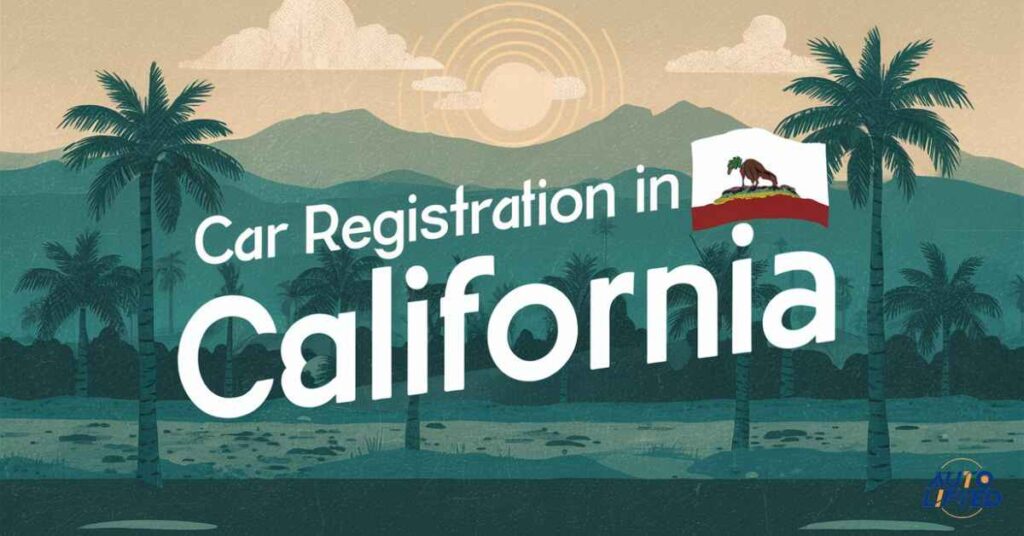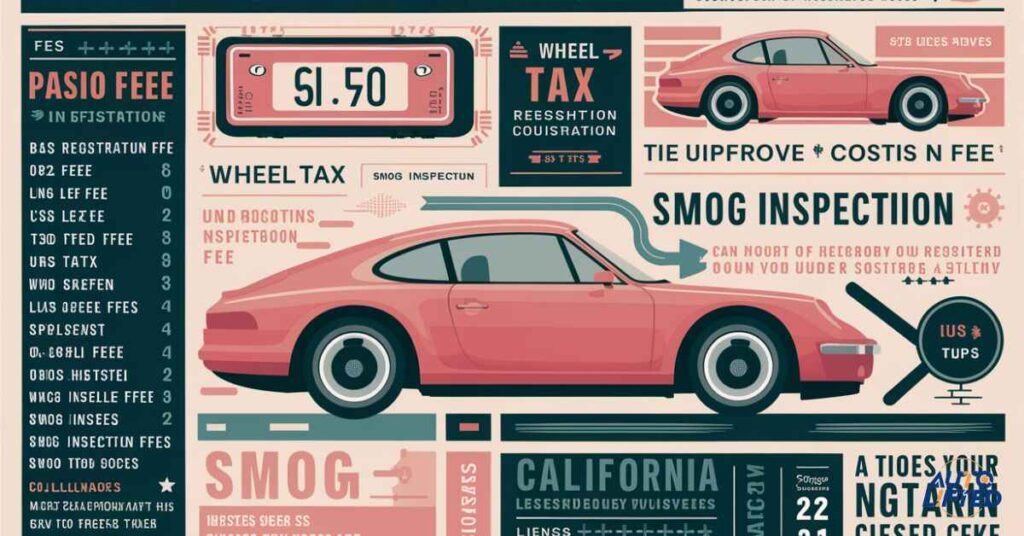Buying a new car is an exciting milestone, but the process doesn’t end with driving off the lot. If you’re a California resident, you’ll quickly realize that registering your new wheels comes with a hefty price tag that might catch you off guard.
From mandatory fees to value-based costs, the expenses can add up quickly. This comprehensive guide will break down all the factors involved in registering a car in the Golden State, so you can budget accordingly and avoid any unpleasant surprises down the road.
We’ll cover the initial registration costs for new and used cars, renewal fees. Why California’s rates are so high, recent increases, penalties for late registration.
Payment methods, special situations like military exemptions, and whether these Vehicle Registration Fees are tax-deductible. Buckle up and let’s dive into the intricate world of car registration fees in California.
Understanding the Costs of Car Registration in California

Registering a car in California involves various fees, making it one of the most expensive states for car registration. Initial costs include a base registration fee of $46, a CHP fee of $23, and a Vehicle License Fee (VLF) of 0.65% of the car’s value. Additionally, there are Transportation Improvement Fees ranging from $27 to $192 and varying county fees.
Renewing registration is less costly but still significant. Renewal fees include a registration fee of $46 to $60, a CHP fee of $28 to $32, and the VLF. Additional costs may include a smog abatement fee of $25 and county/district fees between $7 and $47. Timely renewal is essential to avoid hefty late penalties.
Read This Blog:
What Happens If A Leased Car Is Totaled?
Upfront Costs: How Much to Register a New or Used Car in California

When you purchase a new car in California, be prepared to open your wallet wide for the initial registration process. The state imposes a range of mandatory fees that can quickly add up, especially for higher-value vehicles.
Initial Registration Fees for New Cars
The primary fees associated with registering a new car in California include:
- Registration Fee: $46
- California Highway Patrol (CHP) Fee: $23
- Vehicle License Fee (VLF): 0.65% of the vehicle’s value
- Transportation Improvement Fee: $27 – $192 (based on vehicle value)
- County/District Fees: Varies by location
To give you a better idea, let’s consider a hypothetical scenario. If you purchase a new car valued at $30,000, your Vehicle License Fee (VLF) alone would be a whopping $195 (0.65% of $30,000). Add in the other mandatory fees, and you could be looking at an initial registration cost of well over $500.
It’s also important to note that additional costs, such as smog certification fees, may apply depending on the type of vehicle and your location.
Used Car Registration Costs
While the fees for registering a used car are generally lower than for a new one, you’ll still need to factor in costs like the Vehicle License Fee (VLF) based on the car’s value. Additionally, you may need to provide extra paperwork, such as a Bill of Sale, when transferring ownership from a private party.
Annual Renewal Fees for California Car Registration
The good news is that the cost of renewing your car registration in California is typically lower than the initial registration. However, it’s still not a cheap endeavor.
Overview of Renewal Costs
When it’s time to renew your registration, you’ll need to pay:
- Registration Renewal Fee: Around $46-$60, depending on vehicle type
- California Highway Patrol (CHP) Fee: Around $28-$32
- Vehicle License Fee (VLF): 0.65% of the vehicle’s value
- County/District Fees: $7-$47, depending on your county
- Smog Abatement Fee: $25, if applicable
Based on these fees, the total renewal cost can range from approximately $150 to $300 or more, primarily depending on your vehicle’s value and the county you reside in.
It’s crucial to renew your registration on time to avoid costly late registration penalties, which we’ll dive into later.
Why is Car Registration So Expensive in California?
If you’re wondering why the car registration fees in California are so high compared to other states, there are several key reasons behind these steep costs.
- Road Maintenance and Infrastructure: A significant portion of the registration fees goes towards maintaining and improving California’s vast network of roads and highways. With an extensive transportation infrastructure that requires constant upkeep and repairs, these funds play a crucial role in keeping the state’s roads safe and functional.
- Environmental Programs and Emissions Regulations: California has taken a proactive stance in implementing various environmental programs aimed at reducing air pollution and promoting sustainable transportation. Some of the registration fees are allocated to initiatives like the Air Resources Board and the California Highway Patrol’s efforts to enforce emissions regulations.
- Vehicle Weight and Emissions-Based Pricing: Heavier vehicles and those with higher vehicle emissions generally face higher registration fees. This pricing structure is designed to incentivize the use of more fuel-efficient and environmentally friendly vehicles.
- Vehicle Value-Based Vehicle License Fee (VLF): As mentioned earlier, the Vehicle License Fee (VLF) is calculated as a percentage (0.65%) of your vehicle’s value. This means that more expensive cars will naturally come with higher registration fees.
- Funding for State Programs and Initiatives: Registration fees also contribute to funding various state programs and initiatives, such as the California Department of Parks and Recreation’s Off-Highway Motor Vehicle Trust Fund, which supports the management and maintenance of off-highway vehicle recreation areas.
Understanding Recent Registration Fee Increases

In 2017, the California legislature passed Senate Bill 1, which not only increased the state’s gas tax but also implemented additional fees for electric and hybrid vehicles.
Starting in 2020, electric vehicle owners were required to pay an annual fee of up to $175, based on the vehicle’s value. This fee was introduced to offset the lack of gas tax contributions from electric vehicles, which don’t consume traditional gasoline.
While the initial fee may seem modest, it’s essential to consider the potential for further increases in the future as the state continues to explore ways to fund its infrastructure and environmental initiatives.
The Steep Cost of Late Registration Renewal
Failing to renew your car registration on time in California can result in costly penalties. The late registration penalties are calculated as a percentage of the Vehicle License Fee and Vehicle Weight Fee, plus additional flat fees.
The longer you delay the renewal, the higher the penalties will be. For example:
- 1-10 days late: 10% of the Vehicle License Fee and Weight Fee, plus a $10 registration late fee and a $10 CHP late fee.
- 31 days to one year late: 60% of the Vehicle License Fee and Weight Fee, plus a $30 registration late fee and a $30 CHP late fee.
These penalties can quickly add up, making it crucial to renew your registration on time to avoid unnecessary financial burdens.
When and How to Renew Your California Registration

To ensure you don’t incur any late penalties, it’s essential to stay on top of your car registration renewal in California. The DMV will send you a registration renewal notice approximately 60 days before the expiration date, making it easier to keep track.
Also Read This Blog:
How To Stop Car Alarm Without Key
Step-by-Step Online Renewal Process
Renewing your registration in California is relatively straightforward, thanks to the state’s online renewal portal. Here’s a step-by-step guide to the process:
- Gather the required information, including your vehicle’s license plate number and Vehicle Identification Number (VIN).
- If your vehicle requires a smog check, ensure you’ve successfully completed the test at an authorized facility.
- Visit the DMV’s online renewal portal and enter your vehicle information.
- Review and pay the applicable fees using a credit card, debit card, check, or cash (if paying in person).
By following these simple steps, you can easily renew your registration from the comfort of your home or office, saving you valuable time and hassle.
Special Registration Cases
While the standard registration process applies to most vehicle owners in California, there are a few special cases worth mentioning.
Military Exemptions
Active-duty military personnel stationed in California, along with their spouses, are exempt from paying the Vehicle License Fee (VLF) when registering their vehicles. However, they are still responsible for paying the other mandatory fees.
Getting a Duplicate Registration
If you happen to lose or damage your registration card, don’t worry – the DMV offers a simple process for obtaining a duplicate. By submitting an application and paying the necessary fees, you can secure a replacement card, ensuring you remain compliant with the state’s regulations.
Tax Deductibility for Business Use

For individual taxpayers, car registration fees are generally considered personal expenses and are not tax-deductible. However, if you use your vehicle for business purposes, a portion of the registration fees may be deductible as a business expense
California DMV Offerings
To help vehicle owners understand and prepare for the costs associated with registration, the California DMV provides several useful online tools and services.
Fee Calculators for Accurate Estimates
Not sure how much you’ll need to budget for your vehicle’s registration? The DMV offers several fee calculators that can provide an accurate estimate based on your specific circumstances:
By inputting details like your vehicle’s make, model, and value, you can get a comprehensive breakdown of the fees you’ll need to pay, allowing you to plan accordingly.
Specialty and Vanity License Plates
If you’re looking to add a personal touch to your ride, California offers a range of specialty and vanity license plates for an additional fee. From supporting various causes and organizations to creating a custom plate with your desired combination of letters and numbers, these plates can be a fun way to express your individuality on the road.
Frequently Asked Question
How much did it cost to register a car in California?
As of April 13, 2024, registering a car in California can range from a few hundred dollars to over $1,000, depending on the vehicle’s value and other factors like county fees.
How does California calculate car registration fees?
California calculates car registration fees based on several factors, including a base registration fee ($46), a CHP fee ($23), a Vehicle License Fee (0.65% of the vehicle’s value), a Transportation Improvement Fee ($27-$192 based on vehicle value), and county/district fees.
How much is a California license plate?
The cost of a California license plate is typically included in the overall registration fees, which includes the base registration fee of $46, but specific fees for personalized or specialty plates can vary.
How much does it cost to transfer vehicle registration in California?
Transferring vehicle registration in California typically costs around $15 for the title transfer fee, plus any additional fees such as the registration fee, use tax, and any county or district fees applicable.
How much is car insurance in California?
The cost of car insurance in California varies widely based on factors like the driver’s age, driving history, and location, but on average, it can range from $1,200 to $2,000 per year.
What is a license fee in California?
The Vehicle License Fee (VLF) in California is an annual fee based on 0.65% of the vehicle’s current market value, which contributes to the overall registration cost.
Conclusion
Registering a car in California is a costly endeavor, with fees ranging from a few hundred dollars to over $1,000. Initial registration costs for new cars include a base fee, CHP fee, Vehicle License Fee (0.65% of the car’s value), Transportation Improvement Fee, and county fees.
Renewal fees are lower but still substantial, and late renewals incur significant penalties. High registration costs are attributed to road maintenance, environmental programs, vehicle weight and emissions, and state funding needs.
Military personnel may receive fee exemptions, and business-use vehicles might have deductible fees.
Accurate estimates and specialty plates are available through the DMV. Understanding these factors helps residents budget for registration and avoid unexpected costs.
